

Duke Ellington
Unlike other leaders of big bands, Edward Kennedy "Duke" Ellington (1899-1974) personally created most of the music played by his orchestra. With insight and sensitivity, he composed pieces designed for specific players and emphasized the individuality of his band members. By writing highly personal harmonies, by concerning himself with new musical forms, and by creatively using the sound qualities of the instruments in his band, he created a body of original, innovative music. He is arguably America's greatest all-around musician—composer, orchestrator/arranger, songwriter, bandleader/conductor, accompanist, and soloist.
Duke Ellington, a native of Washington, D.C., in the 1930s. Duke Ellington Collection, National Museum of American History Archives Center.
Ellington sought out musicians who could contribute distinctive sounds to his band. His work is defined by common musical threads, such as the sounds of muted brass instruments and a high, wailing clarinet; distinctive harmonies; his unique piano playing; and unusual combinations of instruments.
When swing music and dancing became a national obsession in the late 1930s, Ellington stood above the pack, continuing to go his own way. He wasn't interested primarily in establishing a good beat for dancing, but rather in exploring his musical imagination. A prime example is Caravan, which he coauthored with his trombonist Juan Tizol.
